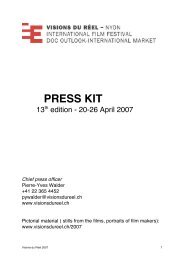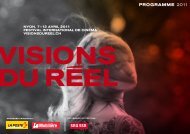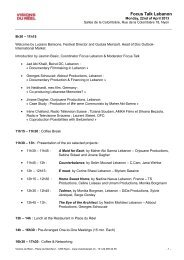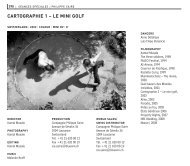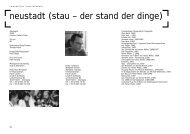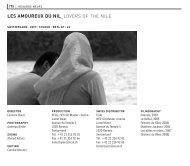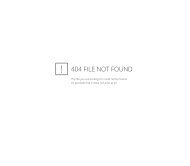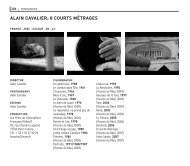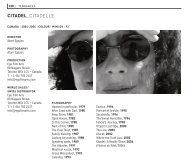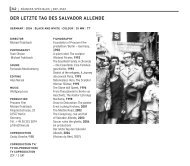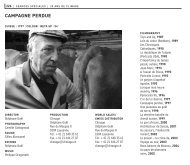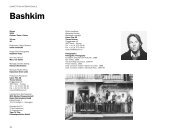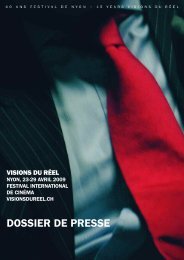Katalog 2013.pdf - Visions du Réel
Katalog 2013.pdf - Visions du Réel
Katalog 2013.pdf - Visions du Réel
Create successful ePaper yourself
Turn your PDF publications into a flip-book with our unique Google optimized e-Paper software.
atelier – eyal sivan<br />
209<br />
The Truth shall<br />
set you free<br />
The cinema of Eyal Sivan<br />
“The problem is to accept<br />
a sequence in history that<br />
began in 1933 and ended<br />
in 1948. It is obvious that<br />
without Lanzmann’s barber<br />
the one of “Route 181”<br />
wouldn’t exist. If the<br />
genocide of European Jews<br />
had not happened, then<br />
Europe would not have<br />
vomited their remains on<br />
the heads of the Palestinians.<br />
The barber of<br />
“Route 181” does not deny<br />
the existence of the barber<br />
of “Shoah”, on the contrary,<br />
he confirms it. He says<br />
that both are victims of<br />
the West, of colonialism.<br />
The bi-national argument<br />
should envisage our future<br />
not in Europe, but in front<br />
of Europe, and oblige her to<br />
take on her responsibilities<br />
towards both the Israelis<br />
and the Palestinians. We are<br />
at this point because it is<br />
what Europe wanted.” 1<br />
“A Jew is an Arab<br />
born in Poland”<br />
(Eyal Sivan)<br />
Eyal Sivan’s work represents an exciting<br />
point of departure to reflect on what is<br />
still defined “documentary” today.<br />
At the core of Sivan’s work a relentless<br />
question beats. What is truth Truth not<br />
as a ‘per se’ value, nor as an absolute or<br />
an ‘a priori’ factor, but rather as a dialectical<br />
process open to critical observation<br />
like a work in progress. In this sense,<br />
truth is not a corpus of ideology – or<br />
confession-related data inevitably shutting<br />
out those who don’t share them,<br />
but a process of partaking in the truth<br />
discourse. Truth as such is not meant as<br />
revelation, but as critical work and conquest<br />
of freedom from truth itself – thus<br />
ceasing to be binding (to assumptions<br />
of identity, faith, or ideology) and, on the<br />
contrary, sparking a process of liberation<br />
from its own premises. Not for nothing<br />
goes the motto: “The truth shall set<br />
you free.” Gospel of St John 8:32<br />
Therefore, truth according to Sivan, and<br />
apparently to his cinema, is always ‘a<br />
posteriori’. It is the outcome of analysis.<br />
Of an investigation. And as such,<br />
eternally revisable. The object of more<br />
investigations. In this sense, all of Eyal<br />
Sivan’s cinema, by putting itself at the<br />
service of truth, is paradoxically aimed<br />
at setting us free from truths and<br />
returns us to a secular, open, critical,<br />
and ultimately problematic idea of truth.<br />
This truth is not meant as a teleological<br />
purpose but as a strategy of liberation:<br />
in the first place, liberation from the<br />
dogma of truth itself.<br />
This is the only way – throughout an<br />
unrelenting process of revision – to<br />
understand the ethics of work underlying<br />
the filmmaking of Eyal Sivan who,<br />
like a pro in a long-gone Hollywood,<br />
recites: “I believe in hard work.”<br />
There are two concepts underlying the<br />
filmmaking of Eyal Sivan, basically history<br />
and revision. Not by chance does<br />
Sivan state that “documentary is the<br />
idea of revision itself.” In this sense,<br />
reviewing can only become reviving.<br />
You review to revive. This dynamics, in<br />
turn, can’t help questioning the acquired<br />
notion of history and the idea that substantiates<br />
it.<br />
The biggest problem to be found in this<br />
practice, according to Sivan, is the risk<br />
of re<strong>du</strong>cing “history to a story”. Here too<br />
Sivan goes against the tide as far as<br />
rules in the documentary world are concerned:<br />
commissioning editors impose<br />
pro<strong>du</strong>ction and narration guidelines<br />
Editing is the place where<br />
(hypothetical) truth is tested<br />
because in a materialistic<br />
outlook, truth is always the<br />
outcome of some work.<br />
which are becoming cages that tends<br />
to normativize formal outlooks and<br />
strategies. He actually denounces the<br />
on-going pro<strong>du</strong>ction system as a new<br />
“totalitarianism”.<br />
“A good story means nothing”, maintains<br />
Sivan. The basic problem is how<br />
to relate to the “structuring device” and<br />
consequently “how to break the timeline”.<br />
Narrative time is already a story of<br />
time itself (a ‘truth’), therefore it must<br />
be questioned to activate the process<br />
of revision.<br />
Before going on, another premise<br />
should be made clear.<br />
The idea of revision usually conveys a<br />
negative meaning. Revision is commonly<br />
understood as an ideological, rightwing,<br />
reactionary work aimed at e.g.<br />
denying the horror of genocide as far<br />
as the destiny of Jews in the extermination<br />
camps is concerned, or relativising<br />
the genocides committed by Pol Pot’s<br />
regime – as a portion of the Cambodian<br />
political class is currently doing in courts



